Nautical idioms and sailing terms
From “Walking the plank” to “At loggerheads“, nautical idioms have enriched our language…
51. Walking the plank
If you have to “walk the plank” your boss has just given you an ultimatum to resign. As in “After John showed up late again he left for good. He wasn’t fired but I think he was forced to walk the plank.
A metaphoric idiom that goes back to the ultimate punishment used in the 1600s where the accused sailor was forced to walk off the end of a plank placed on the side of the ship. This custom was mainly used among pirates and resulted simply in the accused drowning at sea.
52. Keelhaul
Today we still use the term “keelhauled” if someone received a severe verbal chastising. As in “as John finished his speech he knew he failed as the crowd keelhauled him”.
Yes, another rather cruel practice was to keelhaul the accused. It finds its origin in maritime practice from as early as the 1600s and comes from the Dutch word “kielhalen”, which freely translates to “to haul someone under the keel of a ship”.
The process was rather rudimentary where a rope was deployed under the ship from port to starboard and then broad back on board. The accused bound hands were tied to the end of this rope. The other end of the rope was then attached to the accused bound feet so forming a loop around the hull of the ship. The accused was then thrown overboard whilst the crew hauled in the rope on the opposite side of the ship forcing the accused to be dragged underwater and under the hull. It was up to the captain to introduce a pause or not depending on the severity of the crime or the cruelty of the captain. Eventually, the accused would surface on the other side of the ship and be hauled back on board.
It must be noted that the ships from that era were most likely covered with barnacles so the injuries of the accused were often severe with cuts and abrasions if they did not drown in the first place. The practice fell out of favour in the 1800s.
53. Down the hatch
Bottoms up and down the hatch are both drinking expressions that find their origin in the maritime industry. When cargo is loaded onto ships it disappears through the hatch of the ship. It doesn’t take a lot of imagination to see the ship consuming the cargo and perhaps hence the analogy.
54. Shove off
Shove off is a nautical term that describes a boat moving away from the shore. In today’s language, we use it to tell someone to go away in an unflattering manner. Ie, get on your bike.
55. Hang tight
To hang tight is is to remain in the same position either physically or figuratively. The ambulance is on its way so hang tight…. The stock price will recover so hang tight…
Naturally, we need to bring this back to a nautical origin otherwise, what is the point of being in this list. In 1854 in Bentley’s Miscellany “hang tight” is relevant to a rope that controls the jib boom. He encourages the rope to “hang tight” and not fail so as to sail away from his enemy. Is this the origin of “hang tight”?

56. I'll take that on board
“Your business requires more cash-flow to succeed.” “Okay, thanks for that advice: I’ll take it on board.” A common idiom which is certainly derived from shipping meaning that you will consider an idea. Literally, you may take something on board a vessel to be stowed and taken on a journey.
57. Welcome on board
“Welcome on board John. I hope you will enjoy your first day at work…” A variation of the “on board” series with a different meaning but with a similar origin meaning. In essence a welcoming gesture to an organisation or group.
58. Go by the board
“Go by the board” means abandoned or rejected something you previously supported. As in: “Now that granny died, will her birthday party go by the board?”
It was used in nautical terms when someone falls overboard when working in the rigging and cleared the deck into the water.
59. Get on board
The last of the “board” variants is “Get on board” which in nautical terms simply means to get onto the ship. The idiom and figurative meaning simply means that you
Agree and partake with a concept or plan. For example: First, I didn’t like John’s idea for an additional shop but after he explained the benefits I got on board and fully supported the concept.
60. Davy Jones' Locker
Davy Jones’ Locker is a metaphor for the bottom of the sea. It signifies the demise of sailors and ships that drowned and sunk respectively. As an idiom, it is used to denote a very bad place at best.
Allegedly, Davy Jones was the proprietor of a pub in London where unsuspecting sailors were drugged and put in boxes (lockers) and then awoke aboard ship to realise they were now in the Navy. See pressed into service.

61. A shot across the bow
In modern-day language, “a shot across the bow” means you give someone a warning. As in, “This is the second time you are late so consider this as a shot across the bow. Next time you will lose your job.”
In the navies around the world, a shot across the bow was often used to change the actions of another ship. For example, if a ship was ordered to stop using international signals and it refused to do so, a shot was fired just in front of the ship (across the bow). This was a warning and clearly communicated to the other ship that it was in range of the cannons and if they did not comply the cannons would fire next at the ship itself.
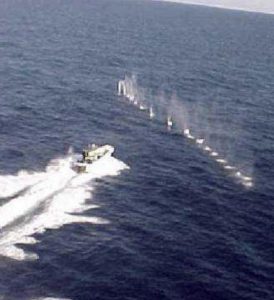
62. Making waves
This expression stems from the 1900s where you can argue that it is more comfortable to have your boat in still waters. Waves created by other boats would make it less comfortable or with heavily laden boats even dangerous.
So today we use the expression to point out that someone is actively and intentionally is causing trouble. For example, “After John had a negative performance review, he started making waves to undermine management.”
63. Plain Sailing
This very old idiom derives its origin from early navigation where there was an assumption by sailors that the earth was flat. Consequently, all navigation techniques were based on this flat earth theory and hence they based their navigation calculations on a “plane surface” rather than a spherical surface. In the 1600s, scholars made no distinction between “plain” meaning “simple” and “plane” meaning “flat” and those two words were used interchangeably.
So today plain sailing simply means without incident or complications. As in: “It was plain sailing for John on his first day at work as he used the IT systems in his previous job.”
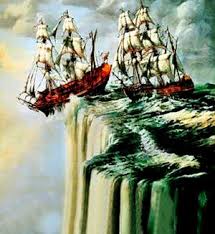
64. Copper-bottomed
Since the 1700s, shipbuilder applied copper sheets to the bottom of their ships to mitigate the issue of marine growth. Marine growth on the hull of a ship slows the ship down and as we know “time is money” or in Navy terms the increase in speed and manoeuvrability could win the battle.
Today, when we say that something is copper-bottomed we refer to the quality and trustworthiness of the thing, be it an idea, a person or anything else… For example, “That idea of John is shipshape and copper-bottomed. I can’t see it fail…”

65. Making up leeway
66. Give me some leeway
The expression “give me some leeway” means to ask for some freedom, some latitude if you like. As stated above, leeway in nautical context the sideways drift of a ship to leeward of the desired course
67. Limey
“She won gold in the Olympics in the Laser Radial class. I swear that girl was born a limey.” Meaning that we think that this girl was born a sailor, or is, a born-sailor…
The term Limey was given to sailors in the British Royal Navy in the 1800s because it was common practice to issue limes to avoid scurvy on their long voyages… The vitamins within the lime we said to have a beneficial effect.

68. Give me some latitude
To give someone some latitude is to give them a bit of space and freedom to achieve their goals rather than micro-manage them.
It is a nautical idiom in as far as ships were able to navigate using latitude and longitude to pinpoint their location on the map.
Lines of latitude measure the north-south position of a ship between the poles. Lines of longitude, or meridians, run between the North and South Poles. They measure a ship’s east-west position. Note that meridians are related to time-zones whereas latitude is more related to temperature as you move closer to, or further from, the equator.

69. Abandon ship
“Abandon Ship” is an official command ordered in the face of disaster which usually translates into the ship’s imminent sinking. It is a bit like the fire alarm in an office building where each and every crew member had specific jobs to do as part of the evacuation plan. However, in the early days of sailing, and in the face of battle it would mean a quick jump overboard before the powder blows.
In today’s speak, we simply refer to a hopeless situation that we are retracting from. For example, “The CEO stopped short of ordering Abandon Ship, but the latest sales figures suggest the ship is sinking…”
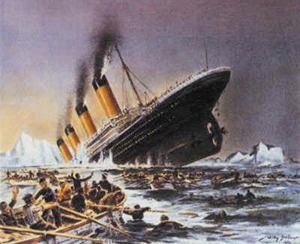
70. Rats deserting a sinking ship
Rats deserting a sinking ship is a saying among sailors explaining that before the ship sinks, the rats will abandon her. It is believed that the rats knew something the crew didn’t so although rats could pose a major problem on ships, deserting rats were seen as a very bad omen.
When we use the phrase now, we often see the rats as neglectful individuals that profited off a failed enterprise.

71. Knock seven bells out of someone
The idiom “Knock seven bells out of someone” is predominantly used in Great Britain and indicates that someone was beaten up (either physically or metaphorically) to an inch of their life.
The ship’s bell was used to communicate a lot of stuff but one thing sailors paid extra attention to was the amount of time left on their watch. Often, sailors operated on a “4 hours on – 4 hours off” roster. Each half-hour, the bell would indicate that the shift was a little closer to concluding. So at the seventh bell, there was not a lot of time left to work. Therefore the idiom focusses on this division to denote that if you knock seven bells out of someone, you nearly finished him off.
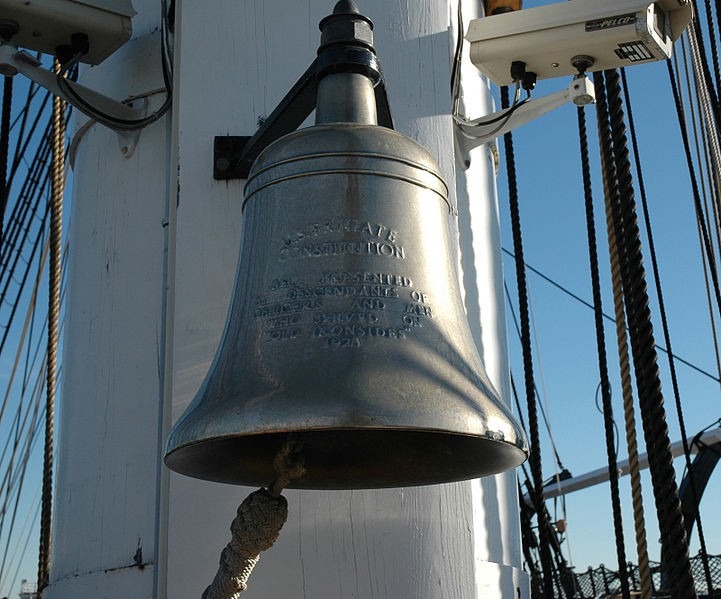
72. Landlubber
Landlubber comes from a late 17th-century combination of “land” and “”lubber”, the latter meaning a clumsy and/or stupid person. Sailors used the word in a denigrating manner to describe people who prefer being on land rather than be on the sea.
Today we use landlubber in a less denigrating manner. For example, “John hung over the railing 50% of the passage. He is definitely a landlubber.”
73. Facing a strong headwind
The restaurants reopened last week but because of the border restrictions and the ongoing Coronavirus situation, they are facing strong headwinds…
Originating from the years of sails, a strong headwind meant the ship needed to alter course or wait it out for better conditions. Either was costing time and money and therefore synonymous with hard times ahead…
74. Jack Tar
Jack Tar is often used to describe a sailor below the rank of officer in the 1700s. It originated because tar was a common substance used in the waterproofing and preserving of just about anything on the old sailing ships. For example, hemp ropes were treated with tar and even the clothing the sailors were wearing was often tarred to improve the resistance against water. It doesn’t take much to realise that the smell of tar was extremely prevalent at best.
So we can still use the idiom today. For example, “She is marrying a Jack Tar so she better deal with the absence of her new husband when he is out at sea…”

75. Letting the cat out of the bag
If we let the cat out of the bag we mean to say that we revealed a secret carelessly and often by mistake. However, in the early days in the British Royal Navy, the cat was something different altogether and referred to the “cat of nine tails” (Cat-O’-Nine-Tails), a whip consisting of nine pieces of rope each containing several small knots. Sailors were tied up and whipped on their bare backs for relatively trivial matters to preserve discipline on the ship. Some argue that is got its name from the scratch wound it left on the sailor’s backs…

76. Not enough room to swing a cat
There is not enough room to swing a cat in this kitchen! We now clearly mean that the kitchen is cramped and too small. Again, the cat we are referring to is the Cat-O’-Nine-Tails. Ie, it literally refers to a space so small, that the bosun was unable to swing his whip effectively to inflict the punishment ordered by the captain.
77. Running the gauntlet
In modern language, running the gauntlet simply means that you are under heavy criticism by your colleagues or the wider community.
It originated from naval practices where a sailor was punished for stealing from his peers. When caught and proven guilty, the thief had to walk the length of the deck between two rows of his fellow sailors beating him with knotted ropes.
The practice was widely adopted throughout most of the military as a form of peer punishment.

78. Ships that pass in the night
The saying dates back at least 150 years. It appears in Tales of a Wayside Inn, by Henry Wadsworth Longfellow – 1863,
“Ships that pass in the night, and speak each other in passing, Only a signal shown and a distant voice in the darkness; So on the ocean of life, we pass and speak one another, Only a look and a voice, then darkness again and a silence.”
No need to elaborate…
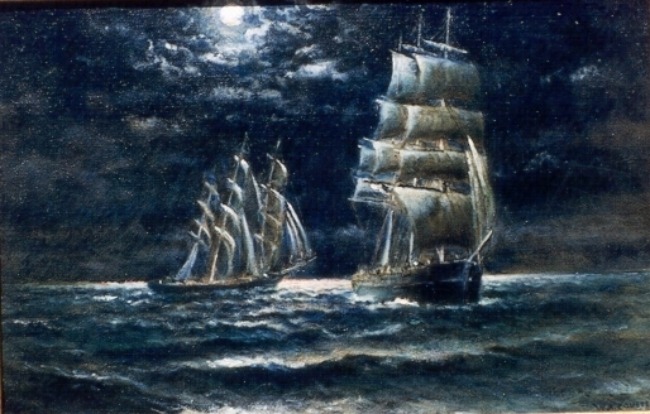
79. We are all in the same boat
He is always complaining about the weather but we are all in the same boat. So we all endure the same hardship…
It originates from risk assessment perhaps by insurance companies in the 17 century. As passengers were all in the same boat, the risk was seen to be equal amongst all passengers.

80. Welcome aboard
Welcome aboard. We are happy to have you on the team.
It is a well-used idiom that finds its origin in the 1500s where passengers or VIP were greeted aboard a ship. Most likely from the France “à bord” meaning the same thing.
Closely related to “All Aboard” which was seen as a warning that the ship (and later trains) were about to depart…

81. At close quarters
1722, Originally a nautical term stemming from “close-fights”. It refers to the confined spaces in a ship between bulkheads where sailors could make their last stand and engage the enemy boarders. Not to be confused with closing on the enemy, it simply refers to close combat in confined spaces.
Today we use it to denote a situation where a fight takes place in a cramped space or position. After entering the house, the police exchanged gunfire at close quarters…

82. To cut and run
If you cut and run, you are getting away in a hurry. “When the robbers could hear the sirens, they cut and run, leaving some of their loot behind…”
Cut and run is most likely a nautical term literally referring to sailing away in such a hurry as to cut the anchor rode and leaving the anchor behind (cut) then sail with the angle of the wind most favourable to achieve maximum speed (run).
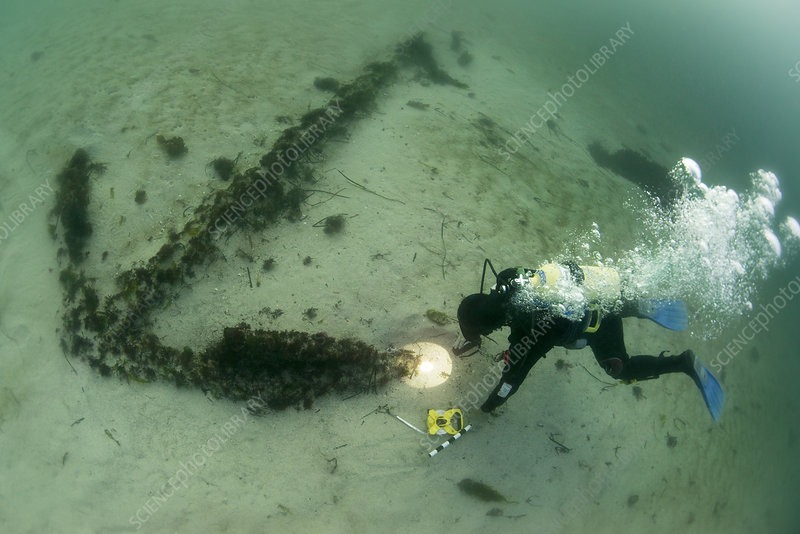
83. Edging your way forward
“He was edging his way forward to a promotion. It will take many years before he gets there.”
Edging forward refers literally to moving in a direction more sideways than forward and denotes slow progress.
It finds its origin in sailing where early sailing ships were notoriously bad at sailing close to the wind (close hauling) and had to tack constantly to achieve some progress on a specific bearing.
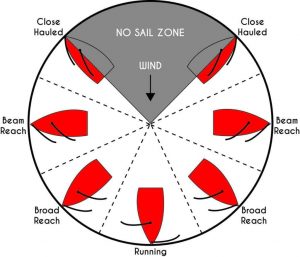
84. Feeling groggy
Most people associate grog with alcohol and feeling groggy is subsequently feeling a bit befuddled often due to the festivities “enjoyed” the previous night.
The origin of grog and feeling groggy are a bit more complex and it takes a rather long path towards an explanation. Let’s have a go anyway… Meet the Old Grog: Admiral Edward Vernon (1684-1757) who was a well-decorated sailor in the Royal Navy and known for his prudent attitude towards the rationing of rum. In order to get the sailors under his command less intoxicated and perhaps to help the budget, Vernon watered down the ship’s rum to the dismay of his men. Working further backwards from here you may ask why they called him “Old grog”? In essence, he loved to wear clothing made from coarsely woven material referred to as grogram or grosgrain or coarse-grained or simply grog.
So the connection is clear. A guy wearing coarsely woven jackets made of grog deserves the nickname “Old Grog” who then dares to water down the sailor’s rum. Grog – rum – feeling groggy; you get the idea…
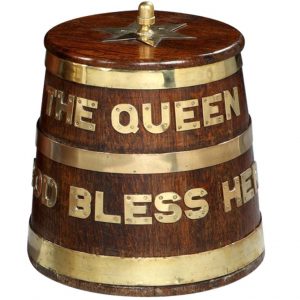
Grog tubs were located on almost all navy vessels and contained the men’s rum rations. Stealing from it was punished by having to run the gauntlet.
85. I can’t fathom it
I had the strangest maths question on my exams this morning. I just couldn’t fathom it.
We are all familiar with this idiom and the fact it uses the word “fathom” leads us directly to a nautical origin.
Literally, a fathom is a measurement of 6 feet, used when referring to the depth of water. Sailors use to “swing the lead” (see idiom 28 above) to figure out the depth of the waters under the keel of their ships. The fathom is, in essence, the arms-length of a person. As not all arms are the same, the fathom had different meanings depending on the size of the ship ranging from 5 to 6 feet.
So over the years, it’s morphed into something that denotes that you can’t get to the bottom if it – get a full understanding.

86. In the offing
Meaning that it is not happening in the next few moments but imminent nonetheless. “There are several tax hikes in the offing if the opposition were to get in…”
Used to describe that part of the sea that could be seen from shore. Ie, that part of the sea visible from beyond the breakers to the horizon. It gets its nautical meaning from the fact that ships often had to delay entering a harbour because of tidal conditions. The ships waited off-shore in the area called the offing until they could “take-off” or “be off” towards their anchorage or mooring within the harbour.

87. Mal de mer
There is nothing like mal de mer. The first 4 hours you are afraid you are going to die; the next four hours you are hoping you will die soon…
Mal de mer is of French origin and simply translates to seasickness. Nautical? I guess so…

88. Shiver my timbers
To look at the meaning of “shiver my timbers” (Shiver me timbers if you want to sound like a proper pirate), it is useful to look at the old use of “shiver” which denotes something falling apart or disintegrating.
So when you hear someone say: “I promise I will look after your cat. Shiver my timbers, I will”, then you are witnessing an oath similar to something like “on my mother’s grave”.
This makes sense as sailors use this oath because breaking it would cast upon themselves the prospect of their ship disintegrating and sinking.

89. Tiding over
Tiding over refers to making limited supplies last for the foreseeable time where supplies may be limited. “The six-pack of beer will need to tide us over until Smithies arrives with the carton…”
Originally, “tide over” simply referred to sailing ships that found themselves without wind and used a combination of anchors and the tidal movements to try to navigate into harbours.

90. On your beam ends
When you are on your beam ends it means that you are in imminent danger. “Two months after he was diagnosed with leukaemia, Smithies was on his beam ends. Luckily, he is in remission now…”
On a large square-rigged sailing ship, the beams are the horizontal timbers from which the sails are suspended. Naturally, when the ends of these beams are close to or touching the water, the ship is heeling dangerously and is in danger of capsizing and sinking.
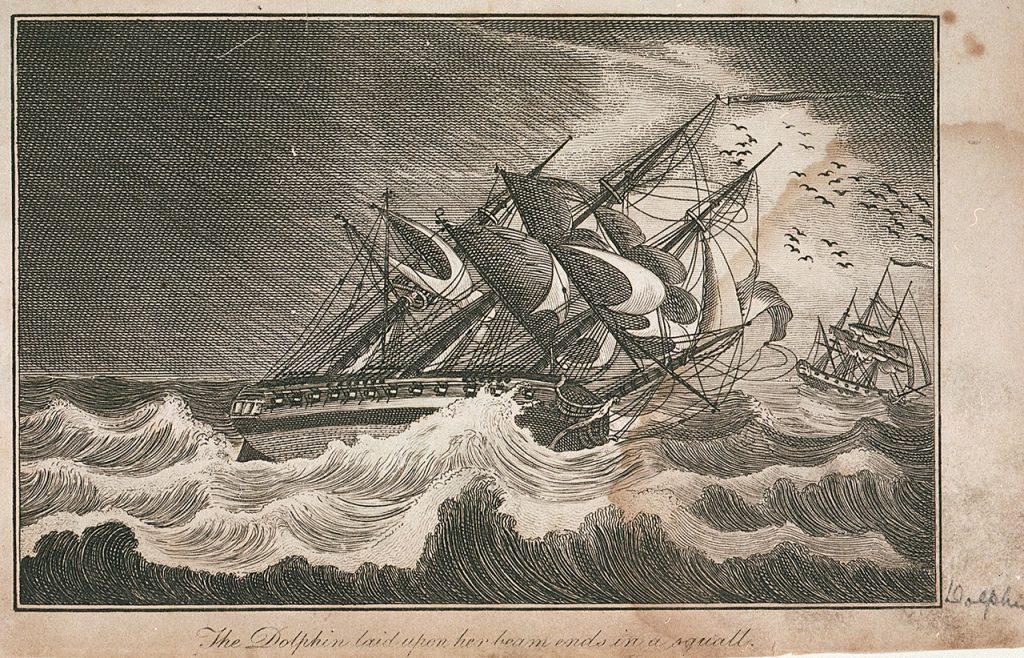
91. Clean bill of health
The saying “a clean bill of health” originated from the 1800s where the crew of a ship was examined by a health official and the ship was given a clean bill of health if no infectious disease were found. The ship then had to submit this “bill” before docking at the next port.
Today we associate it with both medical as well as economic wellbeing. “The treasurer gave the budget a clean bill of health as it moves towards the first surplus in decades.”

92. Anchors aweigh
Aweigh: not away. In nautical terms, it signifies the moment where the anchor is free from the seabed.
The idiom now just means that we are getting on our way; departing.
Similarly “chucks away” means the blocks in front and behind the plane’s wheels holding the plane in place are pulled from under the plane so the plane can take off; an expression originating from the battle of Britain.

93. All at Sea
If you find yourself in a state of confusion you may say that you are all at sea.
The term has its beginnings in early navigation. Ships that found themselves out of sight from land, had some difficulty in accurately navigating.
It is easy to see how the idiom found traction in modern language…

94. On the right tack
On the right tack or on the right track means that your reasoning is leading to the correct conclusion or outcome. As in: “He argues that the house prices are going to rise after we have another drop in interest rates. He might be on the right tack…”.
In sailing, we often have to sail on a bearing that is directly into the wind. Bearing off will deliver more speed but causes the distance we need to covered to increase. The technician on a sailboat will advise the skipper on the best route to take and advises if the boat is on the right tack…

95. Stem the tide
When you stem the tide you stop the course of a trend or tendency. As in “Border closures has stemmed the tide and seen COVID numbers drop significantly.”
“Stem” refers to stopping or restraining which finds its origin in the Norse language “stemma” meaning “to dam”.

96. Push the boat out
If you push the boat out then you act lavishly in your spending or celebrations. Smithies really pushed the boat out when he ordered French Champagne last night…
In a literal sense, you would help a boat owner to push his boat out into the water as it may be too heavy for the sailor to achieve on his own. An old act of generosity not unlike giving someone with a flat battery a push to start their car.

97. Show a leg
In order to rouse a sailor, he was asked to show a leg. One of his legs would protrude from his hammock to indicate that he understood the fact that it was time to get up and that he was awake.
So in today’s language, we say “show a leg” for the same reason. We need someone to get up and out of bed…

98. Touch and go
Things are “touch and go” when the successful outcome of things hang in the balance and could go either way. Collingwood was 4 points behind with 1 minute left on the clock. Although they ended up winning, it was touch and go for a while…
The idiom is connected to sailing because of Admiral Smyth in his Sailor’s Word-book where the idiom was first printed.
“Touch-and-go, said of anything within an ace of ruin; as in rounding a ship very narrowly to escape rocks, or when, under sail, she rubs against the ground with her keel, without much diminution of her velocity.”

99. When someone's ship comes in
When your ship comes in means what someone will do if they become rich and successful.
Smithies will pay all his gambling debts as soon as his ship comes in.
Literally, ship owners would have invested a lot of capital in the ship, its crew and the voyage all in pursuit of a profit. When the merchant’s ship arrived, he would have the means to sell the merchandise and realise his profit.
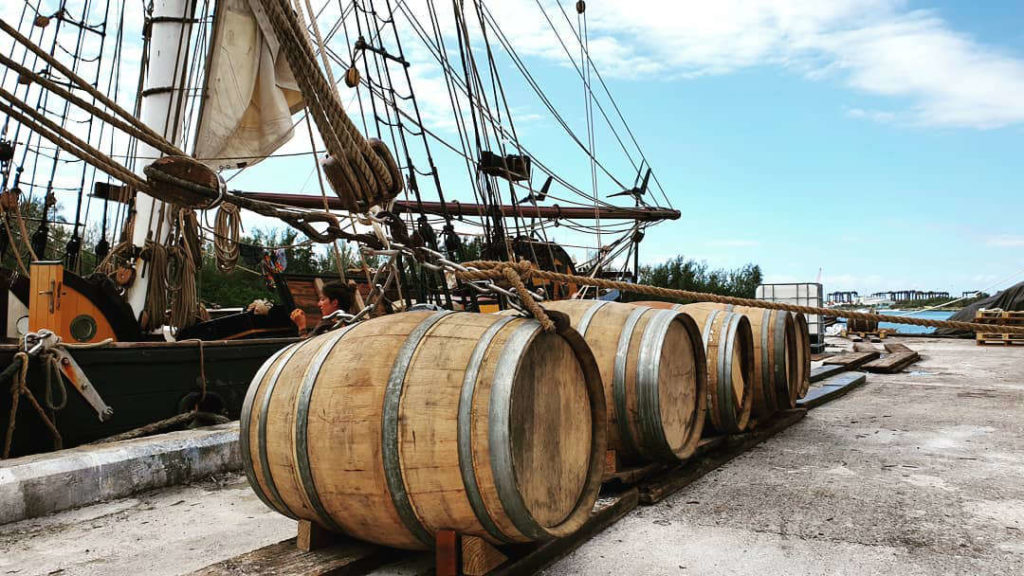
100. At loggerheads
“Those two have been at loggerheads for many years.” Meaning that they had some serious disagreements that are still not settled.
The etymology of loggerhead is a bit fluid and has changed over the years many times with new meaning added over time ranging from a blockhead (dumb person) to a type of turtle. But what we are interested in is a type of tool used in the late 1500s that was used to seal tar in seams on a deck. The tool would best be described as a “hot poker” as we know it today. It was, in essence, a steel bar which may have been picked up in anger once or twice as it presents itself as a formidable weapon for close combat or for settling gambling debt disputes.
In any case, it follows that being at loggerheads draws its meaning from the use of this nautical tool as a weapon.

Other than a tool, the “loggerhead” was also used as a cannon shot. A steel bar was attached to a cannonball which when fired, would spin violently during its trajectory towards the enemy causing destruction and mayhem on impact.
Now used to heat rum-based cocktails… Those Navy boys know how to party…
Do you know any other idioms?
If you have any idioms, expressions or sayings that you think have their origin in sailing or maritime in general then let us know by commenting below. Let’s make this the most comprehensive “sailing did you know” list around…
If you feel there are mistakes in the above idioms then don’t hesitate to say…
Pingback: Nautical idioms and sailing terms 201-250 - Tall Tell Tales
Pingback: Nautical idioms and sailing terms 151 - 200 - Tall Tell Tales
Pingback: 200 Nautical Terms and Sailing Phrases That Have Enriched The English Language - Tall Tell Tales
Pingback: Nautical idioms and sailing terms 101 -150 - Tall Tell Tales